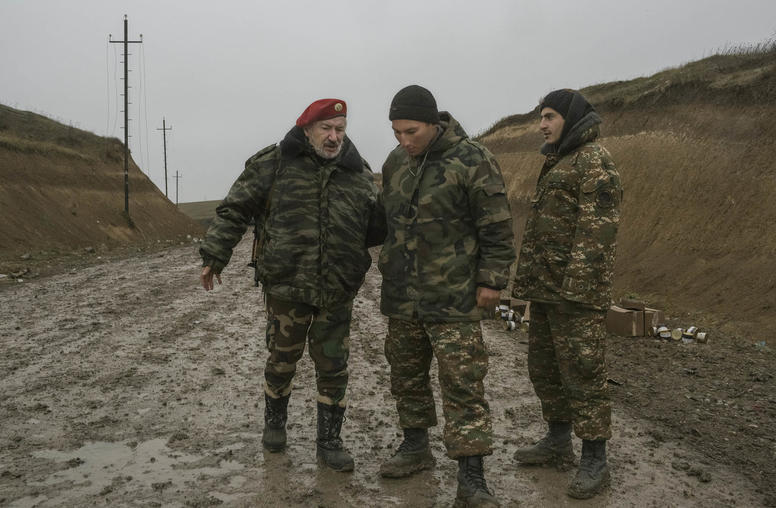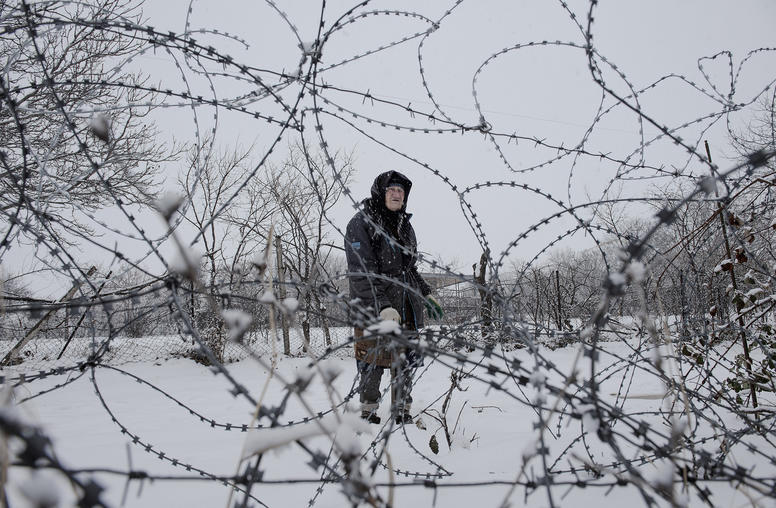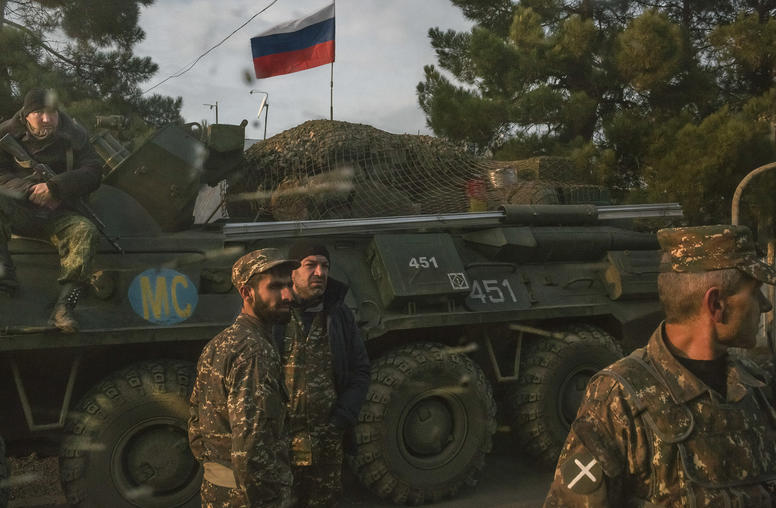The Nagorno-Karabakh Imperative: Protect Civilians, Revive Diplomacy
To stop violence and revive negotiations, a U.S.-Turkish initiative could be the best hope.
The long conflict over Nagorno-Karabakh this month recaptures global attention the only way it ever has: through new bloodshed. Azerbaijan’s swift seizure of the ethnic Armenian enclave has ignited a humanitarian crisis. Most of the territory’s 120,000 residents are fleeing to Armenia, raising the specter of ethnic cleansing. The international community must urgently secure safety for civilians, long the primary victims of this war. Even tougher is the imperative, for peace in the South Caucasus region, to resuscitate negotiations on this conflict’s many open wounds. Any such diplomacy will require influence with Azerbaijan, and a way to achieve that could be a partnership of the United States and Turkey.

Nagorno-Karabakh, a stretch of forested, low mountains and valleys within Azerbaijan, became an international conflict in 1992. That year’s collapse of the Soviet Union escalated warfare in which Nagorno-Karabakh’s majority Armenian population sought to unite the territory with Armenia. Fighting from 1988 to 1994 killed tens of thousands of people. Armenians took control of Nagorno-Karabakh and surrounding Azerbaijani farming districts, expelling hundreds of thousands of Azerbaijanis from their ancestral homes.
Following a 1994 truce, peace efforts by the Organization for Security and Cooperation in Europe (OSCE), the Council of Europe and the United States failed to usher Armenia and Azerbaijan to a resolution of Nagorno-Karabakh and related disputes. Over the next 26 years, Azerbaijan used its ample oil and gas revenues to build up its armed forces. Armed with game-changing aerial drones from its ally, Turkey, Azerbaijan launched an offensive in 2020 that reversed the military advantage in the conflict, seizing the Armenian-occupied districts around Nagorno-Karabakh. This time, tens of thousands of Armenians were displaced.
Russia’s simultaneous roles as invader of Ukraine and key member of the U.N. Security Council, and Turkey’s history with Azerbaijan and Armenia, complicate the task of assembling any effective international intervention for peace and justice. Yet that task is vital. Over decades, Human Rights Watch and other monitoring groups have documented abuses by both sides, including indiscriminate attacks that have killed or displaced civilians. Amnesty International documented actions in the 2020 assault by Azerbaijani forces that it concluded were war crimes. As in each previous eruption of this conflict, every family uprooted from home, every civilian killed, every unaddressed atrocity will simply brew emotional fuel for more years of violence. Entwined with the imperative to revive Azerbaijani-Armenian diplomacy is a need to bolster Armenians’ democracy and support Azerbaijanis’ efforts to regain civic freedoms throttled by authoritarian rule.
Humanitarian and Human Rights Crises
Azerbaijan launched its latest offensive even though it recently held negotiations with Armenia, hosted by the European Union, which condemned the sudden assault. Now the urgent priority is to ensure security for civilians as Armenians jam the one available road to Armenia, fleeing Azerbaijan’s takeover: 66,000 people (about 55 percent of Nagorno-Karabakh’s recent population) displaced as of this morning, according to Armenian officials. Prior to last week’s offensive, Azerbaijan blocked that road for 10 months, forcing critical shortages of food and medicine. Like earlier waves of Armenians and Azeris uprooted in this war, those newly displaced bring accounts of trauma with them.
An international monitoring mission with full access to the region is vital to report and help prevent atrocities. As much as Azerbaijani officials assure the world that Armenians’ rights will be respected, the long-engrained pattern of behavior in this conflict is that civilians on the losing side in any given moment are violently abused — and that pattern is being reported anew. The roughly 2,000 Russian troops in Nagorno-Karabakh, authorized under a 2020 truce, cannot be effective in a protective role. Russia, heavily consumed with its invasion of Ukraine and publicly angry at Armenia, has made only muted responses to Azerbaijan’s blockade and sudden offensive. Russia has criticized Armenia for providing humanitarian help to Ukraine and conducting military peacekeeping exercises this month with U.S. forces.
One step toward a civilian protection mission could be to build on the European Union’s border monitoring mission, established in February to put observers on the Armenian side only of the border with Azerbaijan. A true civilian protection mission would require more resources, and access to the entire conflict zone, both immediately and during Azerbaijan’s establishment of its own authority in Nagorno-Karabakh. Getting Azerbaijan’s consent for that mission would require real influence with its government.
That same influence seems required for any real negotiation toward a peace agreement. In recent months, the European Union hosted periodic meetings between Azerbaijani President Ilham Aliyev and Armenian Prime Minister Nikol Pashinyan, and the United States hosted talks between the countries’ foreign ministers. Each time, the hosts emerged to express optimism about progress toward peace. As of now, the European Union is to convene French President Emmanuel Macron and German Chancellor Olaf Scholz with Pashinyan and Aliyev again October 5 in Spain.
Turkey’s Critical Role
The ineffectiveness so far of talks mediated by the European Union, the United States (and previously the OSCE) seems to suggest that Western governments or institutions have lacked the clout on their own to persuade the combatants to talk seriously enough, and consider the necessarily painful concessions, for any real progress toward a lasting peace agreement. With Azerbaijan now militarily ascendent, any mediation effort particularly will need a partner influential with its government. That suggests a serious U.S. approach to Turkey, long a close ally of Azerbaijan.
Turkey is also ill-placed to mediate on its own; an intervention that Armenians will not trust. Like the European Union, Turkey has only a small presence, sited just outside the conflict zone — 60 troops based with a similar Russian contingent at a joint monitoring center 14 miles east of the Nagorno-Karabakh border. From there, each force reportedly watches the conflict via airborne drones.
The United States and European partners of Turkey should prod Erdogan to act in accord with statements he has made on the conflict, and in parallel with his pragmatic diplomacy since winning reelection as president at the end of May. In recent months, Erdogan has held talks to reduce tensions and normalize relations with old antagonists — Israel and Turkey’s longtime archrival, Greece. He declared to the U.N. General Assembly this month that war in Ukraine “will have no winners and peace will have no losers”— a principle that he might apply to the Armenia-Azerbaijan conflict. Days before that, he met Aliyev and gave voice to the precept that civilians must be protected — although his congratulations to Azerbaijan so far have abstained from any whiff of critique. “I congratulate dear Azerbaijan … for its historic success in the anti-terrorist operation,” he told Turkish reporters this week.”
Erdogan uses the slogan “one nation, two states” to emphasize his support for Azerbaijan and to make that policy part of the nationalist appeal that won him a third presidential term after 20 years already in power. Azerbaijan wields influence with Erdogan’s government in part through the political power of their cultural and historic ties, and partly through Azerbaijan’s strong investment in Turkey’s economy. Indeed, when Erdogan explored options for normalizing relations with Armenia in 2009 and in 2021, Azerbaijan’s opposition to that idea led Turkey to step back. Still, Turkey and Armenia have mutual economic interests in normalizing their relations. Armenia’s Prime Minister Pashinyan is a more welcome partner for Erdogan (as for the United States) than would be a more pro-Russian Armenian leader. Hence the U.S. and Turkish governments share real interests in advancing a peace process between Armenia and Azerbaijan.
The European Union’s high-profile deal last year to buy more Azerbaijani gas, and its simultaneous silence on the Nagorno-Karabakh conflict and its costs, caused Armenian irritation that now leaves the United States, more than the EU, a viable co-initiator of a peace effort between Armenia and Azerbaijan. That path would be arduous — and a negotiated settlement will include painful steps, notably at this point for Armenia. But a major diplomatic initiative, first of all on safety, justice and healing for this war’s victims, is the only path toward a peaceful South Caucasus region. And a U.S.-Turkish conversation is the best way to start.



